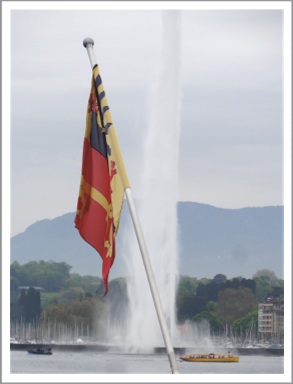-
 Last week, Russian, American, Ukrainian and European Union officials met in Geneva to seek a resolution for the Ukrainian crisis. To everyone’s surprise, a consensus was reached which gave hope for further de-escalation and a way forward.
Last week, Russian, American, Ukrainian and European Union officials met in Geneva to seek a resolution for the Ukrainian crisis. To everyone’s surprise, a consensus was reached which gave hope for further de-escalation and a way forward.
I happened to be passing through Geneva myself the evening before and the day after, en route to the YWAM centre in Lausanne, where we began Thursday with prayer for the talks: for consensus, de-escalation and constructive cooperation. Time will tell if the agreements are upheld.
Geneva of course is known as a venue for such summits. Ronald Reagan and Mikhail Gorbachev met there in 1985 to discuss ways to end the Cold War. Thirty years earlier, Geneva hosted the first meeting of the Big Four – USA, USSR, France and Britain – since the 1945 Potsdam meeting. Henry Kissinger often met his counterparts in this city.
So why Geneva? Well, it’s a UN city, second only to New York in importance. And the International Red Cross has it headquarters there – along with over a hundred other NGO's.
True, but why are they based in Geneva? Why not Zurich, Brussels, Bonn, Paris or Milan… or a city outside of Europe? How did Geneva become such an international city? Was it planned? Or did it happen by chance?
Providence
Seemingly it was by chance that a young French traveller found himself forced by fighting that had broken out to take a detour via Geneva on his way to his destination. Word got around that he was staying overnight in an inn by the lake. His growing reputation as a brilliant lawyer and lay theologian motivated a fiery preacher named William Farel to track his countryman down and convince him that God’s providence had brought him to Geneva to help reform the city.
Only 26 at the time, the lawyer, named John Calvin, reluctantly agreed to stay–and Geneva’s destiny was sealed. Known at the time as the smelliest city in Europe, the city-state was transformed under Calvin’s daily teaching into a strict, orderly, hard-working, model Protestant republic. Thousands of Protestant refugees from Italy, France, England and Scotland poured into the city, often bringing skills and knowledge as watchmakers, bankers, silk workers and printers–and international networks of business and family contacts.
The Geneva Bible was published in the city, translated by English exiles, and travelled to the New World with the Pilgrim Fathers on the Mayflower. The Genevan concept of both the church and the state thus became the norm for many Anglo-Saxons on both sides of the Atlantic.
Calvin became statesman, lawmaker and churchman, and the Genevan model of politics, government, law and church structure spread through the international networks radiating out from the lakeside city located on the borders of Switzerland, France and (then) Italy into many parts of Europe, particularly in the north.
During the Enlightenment, Voltaire and Rousseau, both erstwhile citizens of Geneva, extolled the city’s political organisation, spirit of independence, intellectual life, and openness to foreigners, despite their misgivings about Christianity. Voltaire encouraged Diderot to include an article extolling the city in his Encyclopaedia of 1751.
Convention
Over a century later, a young Genevan evangelical named Henry Dunant proposed the formation of a volunteer society ready to help care for wounded in times of war, backed by an international convention offering protection from the hostilities of the warring parties. This proposal led to the founding of the International Red Cross, with its symbol being the inverse of the Swiss flag.
The ‘Geneva Convention for the Amelioration of the Conditions of the Wounded in Armies in the Field’ was adopted in 1864 to back the work of the International Committee of the Red Cross, which today works globally under multiple names including the Red Crescent and the Red Star of David. Only in 1948 was the organisation’s first non-Genevan, non-Protestant president elected.
Afte the disaster of the First World War, Geneva was chosen over other cities, including Brussels, as the location for the League of Nations. President Woodrow Wilson revealed his preference for Geneva by saying, “I am a Presbyterian”, i.e. a Calvinist.
Despite the failure of the League, its successor the United Nations chose also to be established in Geneva, in neutral Switzerland, along with the International Labour Organisation, the World Health Organisation, twenty-eight international organisations, over 120 NGO’s, the World Council of Churches and the European Nuclear Research Centre, CERN.
Geneva’s rich heritage and contemporary significance is why we plan to be there for this summer’s Masterclass in European Studies (July 28-Aug 1). Why not join us to learn more about Europe’s rich biblical heritage?!
Till next week,
Jeff Fountain
Till next week,

Great to learn about the strong Christian inheritance in this city ! Thanks for sharing !